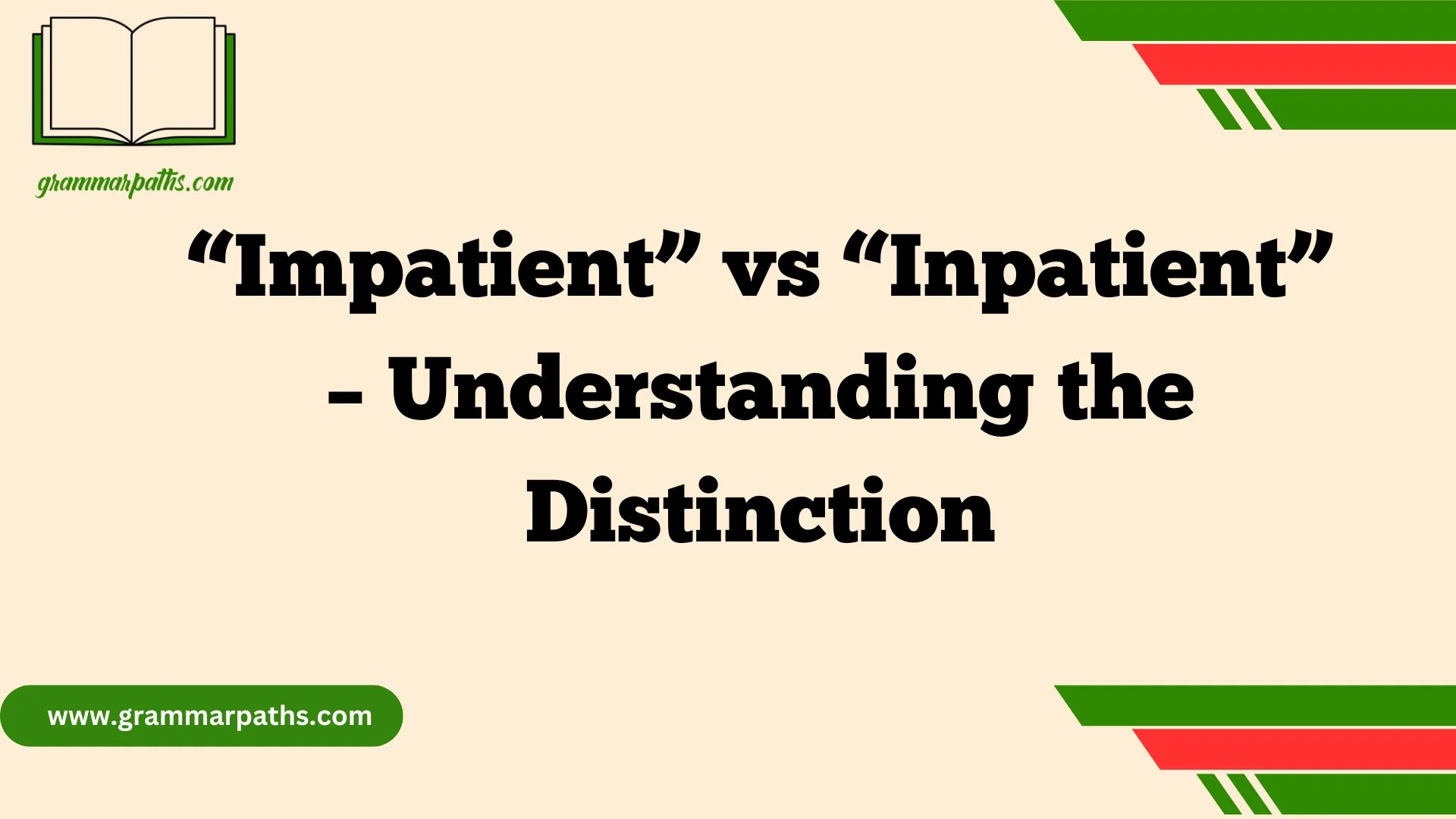Understanding the difference between “impatient” vs “inpatient” is essential, especially when writing or speaking in professional or medical contexts. These two words sound alike, but they have distinct meanings and are used in entirely different situations. Confusing them can lead to miscommunication or misunderstandings, particularly in healthcare, where clarity is critical.
The word “impatient” is an adjective used to describe someone who is eager, restless, or easily irritated when waiting. For example, a person who can’t stand long lines or delays might be described as impatient. On the other hand, “inpatient” is a noun or adjective related to hospital care. It refers to a patient who stays overnight or longer in a hospital or medical facility for treatment.
These terms are homophones, meaning they sound the same but have different meanings and spellings. Knowing when to use each correctly helps improve both your written and spoken English. Whether you’re discussing someone’s attitude or referring to a medical admission, choosing the right term is important. This article will help you explore the differences, provide examples, and clarify any confusion between “impatient” vs. “inpatient” for more accurate communication.
Quick Comparison Table: Impatient vs Inpatient
| Term | Part of Speech | Meaning | Context | Pronunciation |
| impatient | adjective | Restless, eager, unwilling to wait | Emotion, impatience | im-PAY-shunt |
| inpatient | noun | A person admitted overnight to a hospital | Medical, hospital | in-PAY-shunt |
What Does Impatient Mean?
Impatient describes someone who becomes agitated or can’t wait calmly.
- Definition: Emotionally restless or easily frustrated when delayed.
- Origin: From Latin in- (not) + patient (able to endure).
- In use:
- “She grew impatient waiting for her food.”
- “If you’re impatient, traffic feels endless.”
- “She grew impatient waiting for her food.”
- In real life:
- Parents tapping feet in long lines.
- Students pressing “Send” again because Wi‑Fi lags.
- Parents tapping feet in long lines.
- Synonyms: restless, edgy, irritable, anxious, tense.
Why Impatient Matters
Choosing the right word paints clear emotional scenes. Saying someone was impatient instead of anxious shifts the focus from general worry to a lack of calm, helping readers connect with the mood.
What Does Inpatient Mean?
Inpatient is a term for people receiving extended hospital care.
- Definition: A patient staying in a hospital for one or more nights.
- Medical use: Clear distinction from outpatient—the latter goes home the same day.
- Examples:
- “After surgery, John became an inpatient.”
- “The insurance covers inpatient care for diabetes complications.”
- “After surgery, John became an inpatient.”
- Key phrases:
- Inpatient admission
- Inpatient department
- Inpatient facility
- Inpatient admission
Hospital Context
- Short stay (< 24 hours): outpatient.
- Longer stay (overnight or more): inpatient.
- Multiple days: inpatient continues.
Impatient vs Inpatient — Key Differences
Spelling & Pronunciation
- Spelling: One letter difference—impatient vs inpatient.
- Sound:
- **im-**PAI-shunt (emotion)
- **in-**PAI-shunt (hospital stay)
- **im-**PAI-shunt (emotion)
Part of Speech
- Impatient: adjective (adds description).
- Inpatient: noun (refers to a person).
Context Usage
- Emotional vs. medical.
- “I’m impatient” vs “I’m an inpatient“.
Why They’re Confused
- Autocorrect mishaps
- ESL learner challenges
- Writer fatigue or typing mistakes
Real-World Examples
Try these side-by-side to appreciate how each word lives in context:
“Impatient”
- Students grew impatient as class ran late.
- Drivers became impatient in traffic jams.
“Inpatient”
- She was an inpatient at the city hospital.
- Inpatient care lasted three nights following surgery.
Formal vs Informal Use
- Casual: “I’m impatient for vacation.”
- Formal: “The inpatient ward has 12 beds.”
Spoken vs Written
- Spoken: “Man, I’m so impatient waiting here.”
- Written (medical): “The patient was admitted as an inpatient.”
Search Engine Confusion
- Queries: “impatient vs inpatient meaning”
- Guests expecting grammar rules, not medical definitions.
Common Mistakes and How to Avoid Them
- Medical writing: Mixing them up leads to confusion in charts or records.
- Casual conversation: Saying “I was an impatient” isn’t accurate.
- Autocorrect woes: Always proofread before hitting “Send”.
- ESL pitfalls: Learn context clues—emotion vs. hospitals.
- Grammar check: Don’t rely solely on software.
Quick fix: Ask yourself, “Am I describing emotion (impatient) or a hospital stay (inpatient)?”
Impatient vs Inpatient in Healthcare
Healthcare professionals must be precise:
- Misusing impatient in a medical note could mislead.
- Impatient care doesn’t exist—it would imply emotional treatment!
- Hospital forms: “Do you want inpatient or outpatient services?”
- Insurance coverage differs wildly between them.
- Legal documents: mislabeling could affect patient billing.
How to Remember the Difference
- Mnemonic: im-centered emotions, in-hospital.
- Visual trick: Picture “in patient” lying in a hospital bed.
- Audio tip: Saying each aloud highlights their differences.
Memory Aids Recap
| Word | Clue | Thought Prompt |
| Impatient | Emotion + “I’m” feel | I+M = I feel; impatience |
| Inpatient | Hospital + “in” stays | In + patient = hospital guest |
Test Your Knowledge
Fill in the blanks:
- The ___ nurse waited by the door. (Answer: impatient)
- After surgery, she was an ___. (Answer: inpatien
FAQs
What is the difference between inpatient and impatient?
Inpatient refers to someone admitted to a hospital for treatment.
Impatient describes someone who lacks patience or gets irritated easily.
What is the difference between impatience and impatient?
Impatience is the noun form describing the state of being restless or irritated.
Impatient is the adjective used to describe a person feeling that way.
What does it mean to be inpatient?
To be inpatient means staying at a medical facility for treatment that requires overnight care.
It’s a medical term and not related to personality or emotions.
Is it inpatient or in patient?
Inpatient is the correct single word for someone admitted to a hospital.
“In patient” is incorrect in this context and should not be used.
What does impatient mean?
Impatient means easily annoyed by delays or unwilling to wait.
It describes a person’s emotional response, not a medical condition.
What is an example of patient in a sentence?
“The doctor was very kind to the elderly patient waiting for her medication.”
Final Thoughts
In conclusion, while “impatient” and “inpatient” may sound the same, their meanings are completely different—and using them correctly is crucial for clear and effective communication. “Impatient” refers to a person’s emotional state, often involving restlessness or frustration, especially when faced with delays. In contrast, “inpatient” is a medical term that describes someone who is admitted to a hospital and stays overnight or longer for treatment.
Understanding the difference between these homophones not only improves your language skills, but it also helps avoid misunderstandings, especially in healthcare, writing, and professional conversations. By keeping their definitions and usage distinct, you can ensure your spoken and written English remains accurate and appropriate. Always remember: an impatient person might be waiting, while an inpatient is staying in a hospital.

Mia Rose is the passionate writer and founder of GrammarPaths.com, a resource dedicated to helping learners master English grammar, idioms, and writing skills with ease. With a deep love for language and years of experience in teaching and content creation, Mia simplifies complex grammar rules into clear, practical guides that readers can instantly apply.












